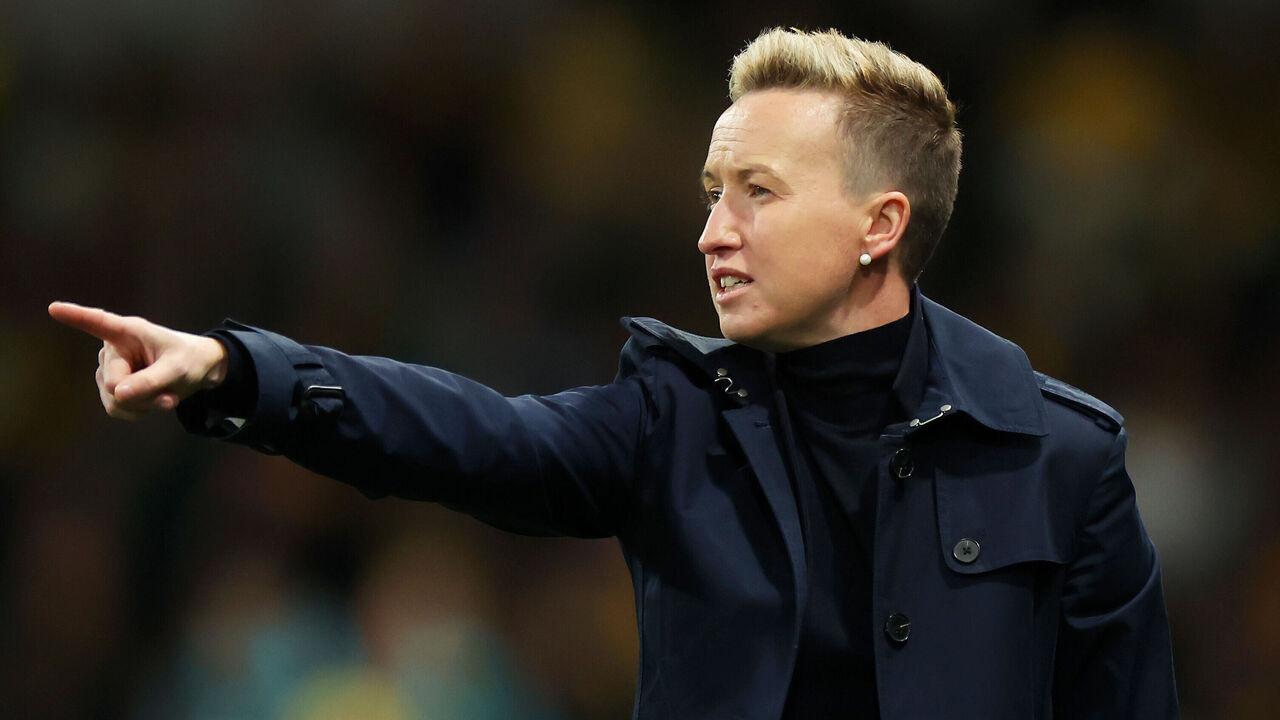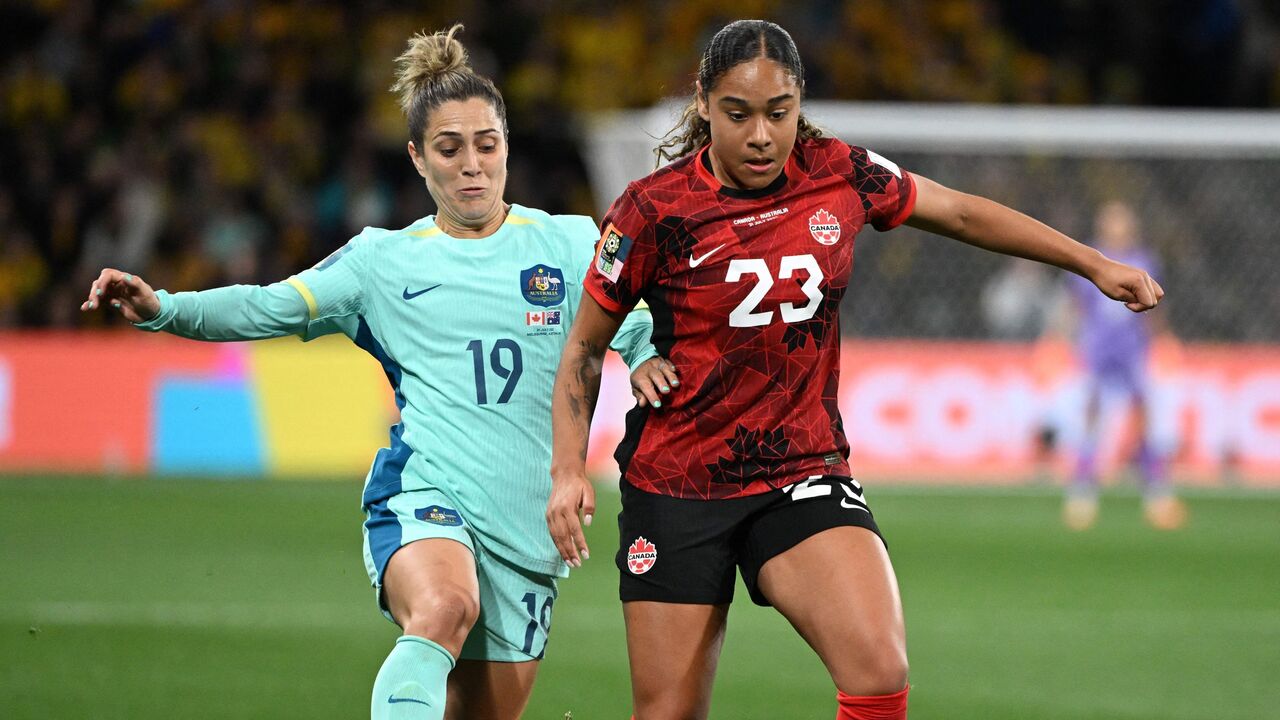What went wrong? 5 takeaways from Canada's early World Cup exit
That was ugly.
Monday's insipid 4-0 loss to Australia eliminated Canada from the Women's World Cup at the earliest possible stage, leaving the country with more questions than answers about the state of the program going forward.
Here are five takeaways from Canada's disastrous tournament showing.
Zero ideas, zero structure, zero fight
Canada couldn't have had a worse tournament if it tried. Outside of one anomalous 45-minute spell against World Cup debutant Republic of Ireland, the women's team played like a group of strangers without purpose or any semblance of a plan. How many times did Canada hoof the ball up the field with nothing but a hope and a prayer? How many times did the Canadians give up when their opponents outpaced them?
There was none of the steel and determination that underpinned the country's gold-medal win at the 2020 Olympics. There was none of the Canadian spirit that captured the country's imagination at previous tournaments. What we saw in Australia was a cheap imitation, a group of players who showed little belief in one another and virtually no attention to detail.
Scoring was an issue for the Canadians well before kickoff in Australia and New Zealand. It was even an issue during the Olympics. But that didn't stop them from winning games. Canada has always been far greater than the sum of its parts, compensating for recent attacking deficiencies by simply keeping the ball out of its own net. That Olympic run was punctuated by goalless draws and narrow victories, none greater than the one in the final, in which Canada edged out Sweden on penalty kicks. Sweden outshot Canada 30-13 in that match, and it made no difference to the final result.
It meant much more at the World Cup. Not only did Canada struggle to create chances, it gave up a lot of them. Canada constantly played from behind, conceding in the opening 10 minutes in two of its three group stage matches. Each of Australia's four goals were avoidable, and because of how poorly Canada defended, it had no choice but to go on the attack and play in a way that hadn't delivered results in the past. It wasn't a question of pressure - Canada's starters play for top clubs, and most of them have handled big occasions before - but a question of preparation.
Priestman got her tactics all wrong
By a miracle of arithmetic, Canada could've advanced with a draw Monday against an Australian side that struggled mightily without top scorer Sam Kerr. But head coach Bev Priestman said she wanted to see her team win.
While a noble and popular request on its surface, Priestman's call to arms was entirely misguided. Canada hadn't started well all tournament, hadn't shown much desire to take over matches, and hadn't played as a team. A draw would've been the most realistic outcome, if not the most fashionable.
If there was ever a time to adopt a bunker mentality, Monday would've been it. Canada must've expected hell from the sellout crowd at Melbourne Rectangular Stadium. Instead, Canada went behind early, fumbled on a number of set-pieces, and surrendered acres of space to Australia's quicker players.

Was defending now beneath them? All four defenders who started in the Olympic final played Monday against Australia, as did two of the three midfielders from the gold-medal match. And yet Canada couldn't even complete the basics. Priestman told TSN afterward that they weren't used to "this level of pressure," and while it was unclear whether she was referring to Australia's high-pressing game or the circumstances around the match, it came across as an excuse for Canada's flimsy defending.
Of course Canada is used to this pressure. It has won penalty shootouts and produced results in the tightest of margins. People could understand and even accept Priestman's rationale had she fielded an entire lineup of teenagers and early 20-somethings in an absolute baptism by fire. But that wasn't the case.
Priestman's tactics had much more to do with Canada's poor performances than an inability to handle pressure. She had to make wholesale changes in two of Canada's three games because she had gotten her initial lineup so wrong. Crucially, she continued to bench Sophie Schmidt, one of the only players capable of threading the kind of defense-splitting passes conspicuously missing from Canada's one-dimensional game.
Off-field distractions can't be an excuse
One of the most immediate reactions to Canada's early elimination was to blame the federation. For months, Canada Soccer has handcuffed its players, limiting training sessions and withdrawing funding before the start of the World Cup. Canada didn't get to play a warmup match before flying to Australia, and while the team reached a tentative compensation agreement with Canada Soccer, it came in the middle of the tournament itself.
It's understandable that a such troubling legal and financial dilemma could have an unwanted effect on performance. Even Schmidt, a 35-year-old veteran, said she considered retiring before the World Cup started. But, while valid, the players' issues aren't unique. Nigeria, which advanced ahead of Canada in Group B, has waged a similar dispute with its federation, threatening to boycott matches over unpaid wages and a lack of assurances over future compensation. Despite these setbacks, Nigeria has managed to find success at this tournament, pairing two tactically clever, if unpopular goalless draws with an upset victory over Australia.
In most cases, teams didn't have much time to warm up, anyway. Australia played a single friendly in July before assuming co-hosting duties, one of just six pre-tournament matches it contested to Canada's four.
There was a simple lack of focus here. It's hard to blame anyone but the players when their response to a goal-saving call in their favor is to concede again minutes later. While it's possible to sympathize with Canada's ongoing fight for further investment, it's just as fair and important to criticize the team for the way it handled this tournament.
"Look, we've been battling our federation for support, but I can't put this on the CSA," captain Christine Sinclair admitted, according to Equalizer Soccer's Harjeet Johal. "There are 23 players out there and staff and we didn't get it done tonight. I think more of it is like a wake-up call for our federation and the lack of a professional league, the lack of support for our youth national teams. I think you're just going to continue to see teams reach our level and surpass us, whatever you want to call it, if things don't change."
Time to bet on promising youngsters
Amid the doom and gloom is a ray of light that can guide the program back to the promised land.
Canada's current roster has five players under the age of 23, including 18-year-old forward Olivia Smith, who made her World Cup debut during Monday's shellacking. Smith forced a good save in the 94th minute with a shot from range and showed the hustle and hunger many of her teammates lacked up front.

"She came on and made such an impact," Schmidt told TSN. "Her future is so bright. She's such a good footballer. You saw it for a little bit. She's aggressive, she's explosive. She ripped a shot from 40 yards, made the 'keeper work for it. Simi (Awujo) is another player like that. We have some younger ones coming through. Hopefully this (loss to Australia) lights the belly so that it doesn't happen again."
Defender Jayde Riviere, midfielder Julia Grosso, and forward Jordyn Huitema are also 22 and bona fide starters for the national team and their respective clubs. Riviere has shown tremendous potential at right-back, Grosso is Serie A's reigning midfielder of the year, and Huitema, now with OL Reign in the NWSL after a stint with French behemoths Paris Saint-Germain, has excellent shooting range and quick acceleration. It's certainly not the end for them.
Olympic qualification far from guaranteed
Canada's next order of business has taken on even more importance.
If the women want a chance to defend their gold medal at the 2024 Paris Games, they must navigate a tougher-than-it-looks home-and-away tie against Jamaica. Canada will face Jamaica in Kingston in the opening leg on Sept. 22 before hosting the decisive second leg in Toronto on Sept. 26.
Canada can't possibly get this one wrong. Being eliminated in the group stage is one thing - it can happen to the best of teams - but failing to get to the Olympics would sting even more.
Jamaica is a tough opponent as well. It held France goalless in its opening match of the World Cup before recording its first-ever tournament win over Panama on Saturday. No one would've thought the Reggae Girlz would advance to the knockout round ahead of group rivals France or Brazil, and yet here we are. It's a huge turnaround for a team that lost all of its group stage matches at the 2019 World Cup with a woeful minus-11 goal differential.
Beating Jamaica would give Canada the boost it needs to reset its program, but it won't be easy.